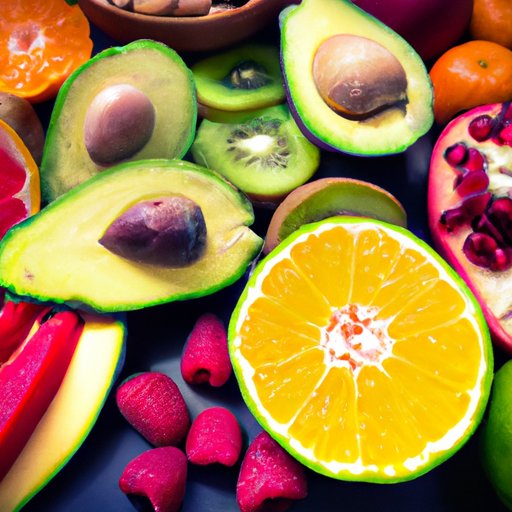
Introduction
The ketogenic diet has gained immense popularity in recent years for its effective weight loss and health benefits. However, incorporating fruits into a keto diet can pose a challenge since many fruits are high in carbohydrates and sugar. In this article, we will explore the best fruits to eat on a keto diet and how to incorporate them for their nutrients, vitamins, and antioxidants.
Benefits of a Keto Diet and Why Incorporating Fruits Can Be Helpful
A keto diet can help in weight loss, improved energy levels, and better insulin regulation. However, a concern with the keto diet is that it restrictions high-carb foods such as fruits. Fruits contain vital nutrients, vitamins, and minerals that can benefit the overall health of one’s body. Specifically, low-carb fruits can provide a much-needed source of fiber and antioxidants. And consuming such low-carb fruits in moderate quantities could be helpful for the benefits of a keto diet.
A Guide to the Best Low-Carb Fruits to Eat on a Keto Diet
Here is a list of the best low-carb fruits to incorporate into a healthy keto diet:
Berries
Berries such as strawberries, raspberries, blackberries, and blueberries are rich in fiber and antioxidants and are low in carbs. For an ounce of raspberries, it contains around 1.5 grams of net carbs.
Avocado
Avocado is an excellent source of potassium, fiber, and heart-healthy monounsaturated fats. For an ounce of avocado, it contains around 2 grams of net carbs.
Olives
Olives are low in carbs and high in healthy fats that can beneficially contribute to our overall health. For an ounce of olives, it contains around 2 grams of net carbs.
Tomatoes
Tomatoes are a great low-carb ingredient in fresh and cooked dishes. Tomatoes are also rich in vitamin C, vitamin K, and potassium. For an ounce of tomato, it contains around 0.8 grams of net carbs.
Overview of Carbohydrates in Different Fruits and How to Track Them on Keto
Tracking carbs is relatively important while on a keto diet, and it is essential to know how much of each fruit is appropriate to consume. Here is a table of the carbohydrate content of some common low-carb fruits:
| Fruit | Net Carbs (per 100 g) |
|——-|———————–|
| Avocado | 1.8 g |
| Blueberries | 12 g |
| Raspberries | 5 g |
| Blackberries | 5 g |
| Strawberries | 6 g |
| Tomatoes | 3.9 g |
| Olives | 1 g |
Delicious Keto-Friendly Fruit Recipes to Try
Here are a few easy keto-friendly fruit-based recipes to try:
Berry Smoothie
– Ingredients: 1 cup of mixed berries, 1 cup of unsweetened almond milk, 1/4 cup of heavy cream.
– Carbs: 8g of net carbs per serving.
Avocado Salsa
– Ingredients: 1 avocado, 2 tbsp chopped cilantro, 1 tbsp lime juice.
– Carbs: 3g of net carbs per serving.
Olive Tapenade
– Ingredients: 1 cup pitted olives, 2 cloves garlic minced, 2 tbsp olive oil.
– Carbs: 2g of net carbs per serving.
Tips for Including Fruit in a Keto Diet Without Going Over Your Daily Carb Limit
Here are a few tips on how to incorporate fruit into a keto diet without going over the daily carb limit:
– Choose low-carb fruit options and consume them in moderation.
– Pair high-carb fruits with high-fat foods, such as berries with whipped cream or avocado.
– Avoid canned fruit or fruit juice as it contains added sugars and preservatives.
– Always check the carb count before trying any new fruit.
Interview with a Nutritionist or Keto Expert About Incorporating Fruit into a Ketogenic Diet
According to Dr. Angela Stanton, nutritionist, and author of the book “Fighting the Migraine Epidemic,” incorporating low-carb fruits such as berries, avocado, and olives into a keto diet can provide essential nutrients while staying in the state of ketosis. She says: “Eating fruit in moderation is crucial for providing wholesome nutrition in a keto diet. It is better to eat a low-carb fruit than any processed food, industrial oil, or sugar.”
Debunking Myths About Fruits and Keto Diets and Clarifying Which Fruits Are or Aren’t Allowed on Keto
A common myth is that fruits cannot be a part of a keto diet. However, certain fruits can be incorporated into a keto diet as long as they are consumed in moderation. Berries, avocados, olives, and tomatoes are perfect low-carb options that can provide vital nutrients. On the other hand, high-carb fruits such as bananas and pineapple should be avoided.
Conclusion
In conclusion, incorporating low-carb fruits into a keto diet can be beneficial for overall wellbeing. Berries, avocados, olives, and tomatoes are excellent low-carb options that can provide essential vitamins and minerals. With a meal tracking plan, moderation, and portion control, keto dieters can include healthy fruit options as part of their daily intake. By following the tips and recipes outlined in this article, individuals can make the most of the benefits of keto while also enjoying delicious fruit.




